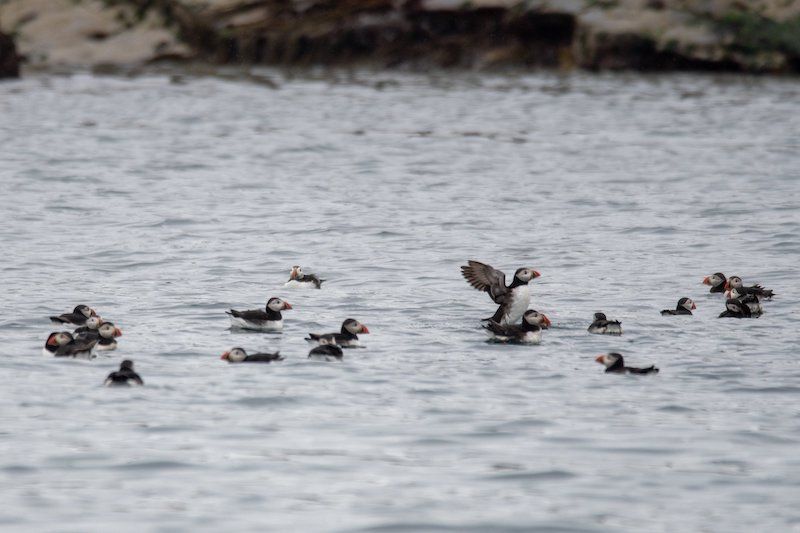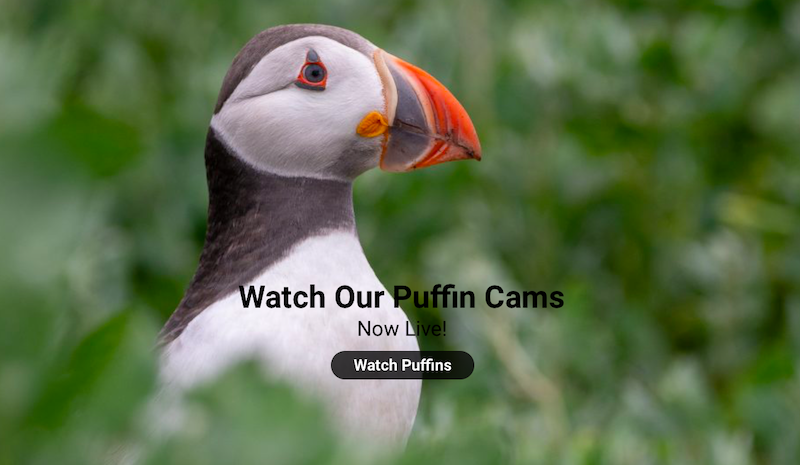

With their tragi-comic eyes, vibrant colours and busy lifestyle, puffin watching makes the perfect diversion from lockdown, especially over a long Bank Holiday weekend.
Breeding season at the colony at Burhou has recently begun and three live webcams are now in operation, livestreaming their lives right into your home, courtesy of Alderney Wildlife Trust.
Around 150 puffins can currently be spied resting, feeding and mating just off the coast of the island, and some have started to venture on to land to tidy up their burrows.
Their daily lives and the challenges they face also form the basis of a raft of free teaching resources to give homeschooling a quirky boost.
Burhou is an island rich in natural diversity and less than 1km long, two km off Alderney's North West Coast. Home to seven species of breeding seabird, its ecological importance is recognised in its international Ramsar status.
The three cameras installed and maintained by AWT officers endeavor to capture most of the puffins above land escapades.
The main puffin cam focuses on a spot where the majority of burrows have been dug. The close up camera is situated outside a regularly used burrow. When the puffin has hatched often shows the parents entering with beak loads of fish for their hungry youngster. The cams also bring nightlife on Burhou into the spotlight with infrared light, which is not harmful to animals.
New for this year is Colony Cam, a device with a powerful zoom and 360 degree pivot which can be remotely controlled. It is currently focused out to sea where puffins are getting ready to move inland. Every day at 16:00 Alderney Wildlife Trust will remotely conduct a tour of the island, via Colony Cam, pointing out and explaining what's happening on the island.
"We hope Puffin Cam can keep people engaged with nature during lockdown," said AWT Head of Outreach Claire Thorpe. "Puffins are cheerful little birds, quite funny , hopefully bring a bit of spring into people's homes and cheer them up.
"Puffins generally mate for life and after winter return to the same place every year to locate their partner and re-establish their pair bond with affectionate behaviour. In the past few days some puffins have been spied making the move from sea to land to re-mould their burrows, ready for laying their egg.

TO VIEW THE WEBCAMS CLICK HERE.
"At the moment you can look out on the main cam for flying mud as the puffins redig and shape their burrows, and stand offs between puffins and rabbits over burrows. Later on you will see them bringing back materials like seaweed and grass to line their nest. From the end of May on the main cam and close up cam, you can see them bringing fish to the puffling, with gulls hovering nearby to try to grab the fish.
"If we're lucky like last year, one night in July we may see the puffling leaving burrow for first and final time. He or she will head straight out to sea and won't return to land until they are ready to breed at about five years of age."
The cameras feature on a site called Teaching Through Nature which contains lessons and materials for pupils at Key Stage One and Two.
Packed with information about the colony, it covers topics like food chains, successful adaptations, conservation and pollution, with a focus on literacy and creativity, and vlogs providing updates on Burhou life.
You can view the webcams and the teaching materials at teachingthroughnature.co.uk or via Alderneywildlifetrust.org .
Pictured top: Image from the Alderney Wildlife Trust Facebook page, click HERE for more.
Comments
Comments on this story express the views of the commentator only, not Bailiwick Publishing. We are unable to guarantee the accuracy of any of those comments.